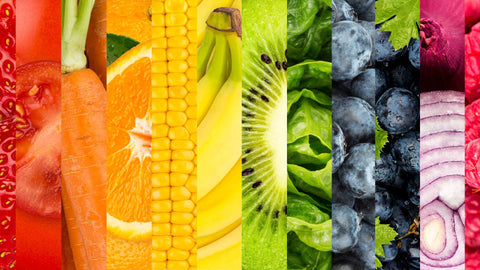
The Ultimate Guide to Adding More Nutrient-Dense Foods to Your Diet
We have all heard the word "nutrient-dense" thrown around quite a bit. But what does it mean? Why is it important? How can you add more nutrient-dense foods to your diet?
Those are all great questions! And we are here to answer them for you.
Nutrient-dense foods are packed with vitamins, minerals, and other nutrients that help keep your body healthy. They are also usually low in calories and fat, which is why they are so good for weight loss.
In this guide, we will look at some of the most nutrient-dense foods out there, and where to find them. We will show you how to shop for them at the store and what kinds of recipes you can make with them at home so that you never have an excuse not to eat healthy again!

What Are Nutrient-Dense Foods?
Nutrient-dense foods are all about nutrients. They are packed with vitamins, minerals and fiber. And they will make up for a lot of the food you get from less nutrient-dense sources.
For more than two decades, nutritionists have recommended eating a diet high in fruits, vegetables, whole grains, nuts and seeds. And research shows that following this advice can help lower your risk of chronic diseases like cancer and cardiovascular disease.
But what exactly makes a food nutrient-dense? Nutrient density is all about the number of nutrients available per calorie or weight of food. If a food has a lot of vitamins, minerals and other nutrients relative to its calories or weight, it is considered nutrient-dense.
Nutrient-dense foods include:
Dark Leafy Greens
Nutrient-dense foods are a great source of vitamins and minerals. They are especially important if you are trying to eat more plant-based foods since plant foods do not have as much protein or fat as animal products.
Dark leafy greens are a great example of nutrient-dense foods; they are packed with vitamins A and C, iron, calcium, magnesium, potassium, and folic acid.
You can get your fill of dark leafy greens by making a salad with spinach, kale, or arugula. Or if you do not like the taste of raw greens? Try sautéing them in olive oil with garlic and salt. Dark leafy greens are also easy to add more nutrients to your diet if you are not eating meat.
Berries
Berries are a nutrient-dense food that can help you get your fill of vitamins, minerals, and antioxidants. Berries contain a lot of fiber, making them easier to digest than other fruits. They also provide more vitamin C than oranges or apples, as well as many other phytonutrients like vitamin K and folate. The best berries for your diet include blackberries, raspberries, strawberries, blueberries, boysenberries and their hybrids.
Beans
Beans are an excellent source of fiber, protein, and vitamins. They are also a great source of iron and folate, which are necessary for healthy blood cells and cell growth. Beans are also an excellent source of magnesium, which helps regulate blood sugar levels and keeps bones strong.
Nuts
Nuts are a great way to get more nutrients into your diet. They are also a source of protein, which helps you feel full longer and can help you lose weight. Nuts are also full of healthy fats that can lower your risk of heart disease.
There are many different types of nuts, so it is easy to find something you like! Some examples include almonds, cashews, hazelnuts, macadamia nuts, peanuts (technically not a nut, but they still count), pecans, pine nuts, pistachios and walnuts.

Benefits of Eating Nutrient-Dense Foods
Nutrient-dense foods are those that provide a lot of nutrients for the calories they contain. They are also called "high-quality" or "whole" foods because they are unprocessed and contain the original nutrients found in their natural state.
Nutrient-dense foods have many health benefits, including:
Better Digestion
If you are eating a diet that is low in fiber, you may experience constipation or diarrhea. Eating foods that contain plenty of fiber helps your body digest food more efficiently, and it can also help you feel fuller faster than other foods. This can help you avoid overeating and weight gain.
Improved Energy
One of the most immediate benefits of eating nutrient-dense foods is improved energy. When you increase your intake of leafy greens and other vegetables, your body will begin to feel more energetic. It is important to note that this increased energy will not come from any kind of "high" or unnatural feeling; rather, it will come from an increased ability to sustain physical activity and make it through the day without feeling tired or fatigued.
Disease Prevention
One of the biggest benefits of eating nutrient-dense foods is that they help prevent disease by keeping your body running smoothly and efficiently. When you eat nutrient-dense foods, your body can perform at its best, which means it is less likely to get sick or suffer from any serious health issues.

How to Add More Nutrient-Dense Foods to Your Diet
Nutrient-dense foods are those that have a lot of nutrients in a small amount of space. They are packed with vitamins, minerals, and fiber, and they will help you feel full and satisfied with fewer calories than other foods.
So how can you add more nutrient-dense foods to your diet? Here is how:
- Add veggies to omelets or salads. Filling up your plate with vegetables instead of carbs like pasta or rice can help you feel full faster and keep you from overeating later on in the day.
- Add fruit to smoothies. If you are craving something sweet but want to cut back on sugar, try adding some berries or bananas to your morning smoothie instead of chocolate syrup! It will still taste delicious without the added sugar.
- Eat smaller meals throughout the day (instead of 2 large meals). Eating smaller meals every few hours keeps your blood sugar levels steady so that you do not get hungry between meals (which often leads us to overeat!).
- Choose whole grains over refined ones whenever possible! They are higher in fiber and nutrients than their processed counterparts!

Supplementation and Nutrient-Dense Foods
Supplementation is an important part of any healthy diet. It can help you reach your daily nutritional requirements and can also help you get the nutrients you may be missing from your current diet.
However, it is important to remember that supplementation is not a replacement for eating real food! Supplementation should be used as a tool to help you get all the nutrients you need, but it is not meant to replace whole foods.
Supplements should always be taken with food, not on an empty stomach. This will help ensure that they are absorbed properly into your system and will not cause any stomach issues.
Dietary supplements, such as Vitanergy natural supplements, are designed to provide optimal nutrient intake for individuals who may not get all the nutrients they need from their diet alone. These supplements can help fill in nutrient gaps and ensure that individuals meet their recommended daily intake of essential vitamins, minerals, and other nutrients.
Some potential benefits of taking dietary supplements may include the following:
- Improved nutrient intake: Supplements can help individuals meet their recommended daily intake of essential nutrients, which may be difficult to achieve through diet alone.
- Enhanced immune function: Certain supplements, such as vitamin C and zinc, have been shown to support immune function and may help reduce the risk of infections.
- Improved cognitive function: Some supplements, such as omega-3 fatty acids, have been linked to improved cognitive function and may help reduce the risk of age-related cognitive decline.
- Increased energy and vitality: Supplements containing B vitamins and iron may help support energy production and reduce feelings of fatigue.

Takeaway
Nutrient-dense foods are the key to good health and longevity, but you can not just eat nutrient-dense foods, you need to eat enough of them and balance them with other foods.
Now that you know what nutrient-dense foods are, how to find them at the grocery store or farmers market, how to prepare them so that they taste good and are even more nutritious (and delicious!), when it is best to eat them (and when not), how much of each kind is best for you, there is only one thing left: get moving!
Exercising regularly is the best way to ensure you get all the nutrients your body needs. And if you do not already have an exercise routine? Now is the time! The sooner you start exercising regularly, your body will start reaping all those benefits.
Also in Blog posts

Supporting Your Liver Health with Natural Ingredients

Naturally Nurturing: The Best Supplement Gifts for Moms


